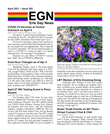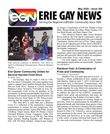Pennsylvania Department of Aging Recognizes LGBTQ Seniors as "Population of Greatest Social Need"
by Michael Mongera
A new directive has taken effect for Older Adult LGBTQ people. As of March 1st, the Pennsylvania Department of Aging (PDA) recognizes Older Adult LGBTQ people as "Greatest Social Need". A more thorough explanation was provided by Secretary of the PA Department of Aging Robert Torres:
"The purpose of this Aging program Directive is to recognize and designate LGBTQ older adults as a population of "greatest social need" as defined in the Older Americans Act, in addition to those populations already included in the Act, and to provide guidance on responsive service delivery for LGBTQ older adults."
The term "greatest social need" means that a "need caused by non-economic factors, which include physical and mental disabilities; language barriers; and cultural, social, or geographical isolation, including isolation caused by racial or ethnic status, that restricts the ability of an individual to perform normal daily tasks, or threatens the capacity of an individual to live independently." as defined by the U.S. Health and Human Services for the Administration for Community Living. Federal funds allocated under the act where enabled from the OAA, to make "specific programmatic requirements of State Units on Aging.
Given the history of inequality for LGBTQ people in history, older LGBTQ people have been subjected to rejection from family and discrimination and prejudice from society. This has left an older LGBTQ generation less likely to seek such services and programs to aid them. Taken from the directive from Secretary Torres;
"The national organization SAGE (Services and Advocacy for GLBT Elders) notes that older LGBTQ individuals are twice as likely to be single, twice as likely to live alone, and four times less likely to have children than heterosexual older adults. A U.S. health survey of older adults reported that 59% of older LGBTQ adults feel that they lack companionship, 53% feel isolated from others, and 53% feel left out (Fredriksen-Goldsen et al., 2011)."
The numbers are more susceptible to rise. Nationwide estimates from The National Resource Center on LGBT Aging rise from 1 million adults age 65 and older who are LGBTQ to rise to 3 million. Some LGBT older people still fear coming out of the closet. Others fear growing older and more vulnerable, which causes many to go back into the closet. Either scenario makes it more difficult for LGBT older people to access the aging services and supports that they need.
The PDA has recognized these challenges. They will work with the Area Agencies on Aging to work towards these directives listed by Secretary Torres;
- Ensure culturally affirming service to LGBTQ older adults by providing staff with LGBTQ cultural compe-tency training and ongoing education
- Conduct effective targeted outreach to LGBTQ older individuals to promote aging services
- Evaluate the needs of the LGBTQ older adult population within each PSA
- Collect sexual orientation and gender identity data as determined by the Department when data collection tools become available or utilize existing data from reliable sources
- Provide written and web-based resources specific to and for the support of LGBTQ older adults
- Engage older members of the LGBTQ community to solicit input and feedback on programs and services
This directive was driven by a commitment the PDA made in their 4-year federally-required State Plan on Aging, which became live on 10/1/20. Their commitments to LGBTQ older adults in the State Plan, in part, were guided by the work of the Aging Subgroup of the PA Commission for LGBTQ Affairs. Their state plan contains six actions specific to the LGBTQ community. The plan, however, is not inclusive of all the work the department is doing to promote culturally sensitive and affirming services for LGBTQ seniors.





